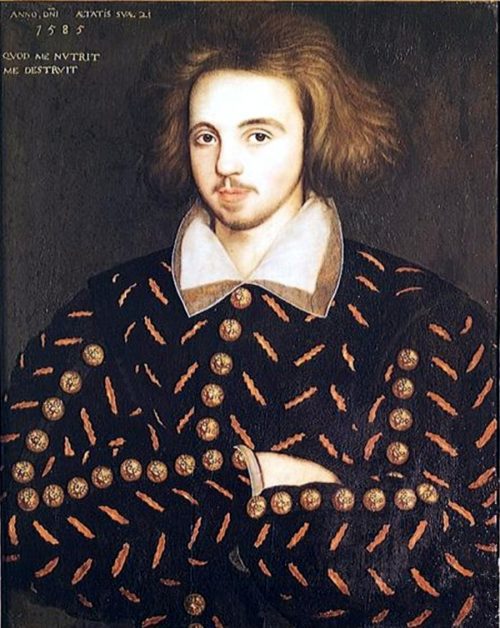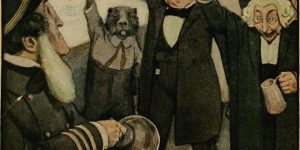Dialogue in Verse Poem by Christopher Marlowe
Dialogue in Verse Poem
DIALOGUE IN VERSE
Jack. Seest thou not yon farmer’s son?
He hath stoln my love from me, alas!
What shall I do? I am undone;
My heart will ne’er be as it was.
O, but he gives her gay gold rings,
And tufted gloves [for] holiday,
And many other goodly things,
That hath stoln my love away.
Friend. Let him give her gay gold rings
Or tufted gloves, were they ne’er so [gay];
[F]or were her lovers lords or kings,
They should not carry the wench away.
Jack. But ‘a dances wonders well,
And with his dances stole her love from me:
Yet she wont to say, I bore the bell
For dancing and for courtesy.
Dick. Fie, lusty younker, what do you here,
Not dancing on the green to-day?
For Pierce, the farmer’s son, I fear,
Is like to carry your wench away.
Jack. Good Dick, bid them all come hither,
And tell Pierce from me beside,
That, if he thinks to have the wench,
Here he stands shall lie with the bride.
Dick. Fie, Nan, why use thy old lover so,
For any other new-come guest?
Thou long time his love did know;
Why shouldst thou not use him best?
Nan. Bonny Dick, I will not forsake
My bonny Rowland for any gold:
If he can dance as well as Pierce,
He shall have my heart in hold.
Pierce. Why, then, my hearts, let’s to this gear;
And by dancing I may won
My Nan, whose love I hold so dear
As any realm under the sun.
Gentleman. Then, gentles, ere I speed from hence,
I will be so bold to dance
A turn or two without offence;
For, as I was walking along by chance,
I was told you did agree.
Friend. ‘Tis true, good sir; and this is she
Hopes your worship comes not to crave her;
For she hath lovers two or three,
And he that dances best must have her.
Gentleman. How say you, sweet, will you dance with me?
And you [shall] have both land and [hill];
My love shall want nor gold nor fee.
Nan. I thank you, sir, for your good will;
But one of these my love must be:
I’m but a homely country maid,
And far unfit for your degree;
[To dance with you I am afraid.]
Friend. Take her, good sir, by the hand,
As she is fairest: were she fairer,
By this dance, you shall understand,
He that can win her is like to wear her.
Fool. And saw you not [my] Nan to-day,
My mother’s maid have you not seen?
My pretty Nan is gone away
To seek her love upon the green.
[I cannot see her ‘mong so many:]
She shall have me, if she have any.
Nan. Welcome, sweetheart, and welcome here,
Welcome, my [true] love, now to me.
This is my love [and my darling dear],
And that my husband [soon] must be.
And, boy, when thou com’st home, thou’lt see
Thou art as welcome home as he.
Gentleman. Why, how now, sweet Nan! I hope you jest.
Nan. No, by my troth, I love the fool the best:
And, if you be jealous, God give you good-night!
I fear you’re a gelding, you caper so light.
Gentleman. I thought she had jested and meant but a fable,
But now do I see she hath play[‘d] with his bable.
I wish all my friends by me to take heed,
That a fool come not near you when you mean to speed.
First printed in The Alleyn Papers (for the Shakespeare Society), p. 8, by Payne Collier, who prefaced it with the following remarks: “In the original MS. this dramatic dialogue in verse is written as prose, on one side of a sheet of paper, at the back of which, in a more modern hand, is the name ‘Kitt Marlowe.’ What connection, if any, he may have had with it, it is impossible to determine.” This Dialogue may be a fragment of The Maiden’s Holiday, a lost comedy, which is said to have been written partly by Marlowe.—DYCE











